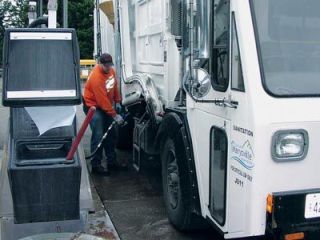MARYSVILLE In an effort to reduce air pollution and help expand the local market for use of clean-burning alternative fuels, Marysville Public Works is running five of its primary solid waste trucks on biodiesel fuel when hauling trash from curbside.
Biodiesel is a renewable fuel made from organic foodstuffs such as soybeans, vegetable oil and animal fat. It is the easiest clean fuel option for most diesel-powered fleets, said Mike Shepard, Marysville Fleet and Facilities Manager.
What we like about biodiesel is that it can be used without engine or fuel system modifications, Shepard said. Additionally, filling up is convenient because fuel supplier PetroCard operates a biodiesel fueling facility near the North County Solid Waste Transfer Station in Arlington, where the city hauls refuse for in-city customers.
Solid waste collection fleets in general are considered good candidates for switching to alternative fuels because, much like transit buses, collection trucks in urbanized areas operate on fixed routes from a central location.
Citizens have to remember that unlike most of the vehicles and equipment in our fleet, heavy-duty garbage trucks run for hours at a time, non-stop, day after day, Shepard said.
The fuel that Marysville is using is known as B20 Biodiesel, containing 80 percent diesel and 20 percent biodiesel. Biodiesel cuts fleet particulate emissions by 22 percent and carbon monoxide levels by 20 percent, according to studies.
As a consumer, Marysville is helping create a market for biodiesel, a market that Snohomish County government is pursuing to reenergize the local agriculture industry. Through Executive Aaron Reardons Focus on Farming Initiative, the County Council awarded $15,600 in grant money for a pilot project to grow canola and mustard seed on fallow farmland that can be ground into oil for biodiesel, effectively utilizing underused farmland that would create a local alternative fuel market. Currently, American Distributing Co. and Donnas Truck Stop, both in Marysville, have started selling biodiesel.
Shepard hopes that the city fuel supplier and others see the benefits in providing biodiesel at all of their fueling stations in the near future. A local fueling station on Cedar Avenue in downtown Marysville does not provide biodiesel and it is too far for the rest of the citys diesel fleet to fuel up at Donnas or Petrocard in Arlington.
We want to work toward a totally environmentally-friendly diesel fleet but need help from local suppliers, Shepard said.
City solid waste trucks now run on environmentally friendly biodiesel
MARYSVILLE In an effort to reduce air pollution and help expand the local market for use of clean-burning alternative fuels, Marysville Public Works is running five of its primary solid waste trucks on biodiesel fuel when hauling trash from curbside.



